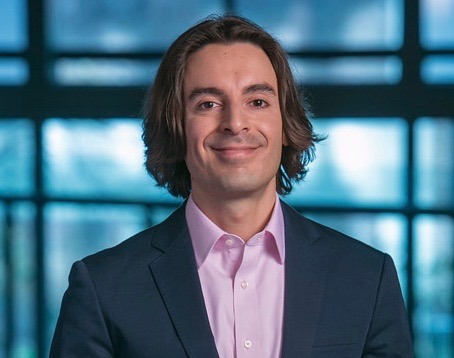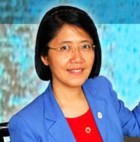Menu
Travel Info:
Faculty

Dr. Paul Sajda |
Dr. Paul Sajda is Professor of Biomedical Engineering, Electrical Engineering and Radiology (Physics) at Columbia University. He is also a Member of Columbia’s Data Science Institute. Sajda is interested in what happens in our brains when we make a rapid decision and, conversely, what processes and representations in our brains drive our underlying preferences and choices, particularly when we are under time pressure. His work in understanding the basic principles of rapid decision-making in the human brain relies on measuring human subject behavior simultaneously with cognitive and physiological state. Important in his approach is his use of machine learning and data analytics to fuse these measurements for predicting behavior and infer brain responses to stimuli. Sajda applies the basic principles he uncovers to construct real-time brain-computer interfaces that are aimed at improving interactions between humans and machines. He is also applying his methodology to understand how deficits in rapid decision-making may underlie and be diagnostic of many types of psychiatric diseases and mental illnesses. Of particular interest to Sajda is how different areas in the human brain interact to change our arousal state and modulate our decision-making. Specifically he is using simultaneous EEG and fMRI together with pupillometry to identify and track spatiotemporal interactions between the anterior cingulate cortex, dorsolateral prefrontal cortex, and subcortical nuclei such as the locus coeruleus. He has found that the dynamics of these interactions are altered under stress, particularly when dealing with high-pressure decisions with critical performance boundaries. These findings are being transitioned to applications ranging from to tracking pilot cognitive state while operating fighter aircraft to identifying biomarkers of healthy thought patterns in patients being treated for major depressive disorder and/or complicated grief. Sajda is a co-founder of several neurotechnology companies and works closely with a range of scientists and engineers, including neuroscientists, psychologists, computer scientists, and clinicians. |

Dr. Mike McShane |
Dr. Mike McShane is James J. Cain Professor II in Biomedical Engineering at Texas A&M University, where he serves as Department Head and is also affiliated with Materials Science & Engineering and the Center for Remote Health Technologies and Systems. His laboratory focuses on the modeling, design, fabrication and testing of small-scale analytical devices, particularly photoluminescent biosensors. Dr. McShane’s research and educational activities cover many areas of biomedical engineering, including biomaterials, molecular biology, biomedical optics, biotransport, bioinstrumentation, signal processing and medical device design. His laboratory produces and tests sensor systems using microscale and nanoscale fabrication approaches of self-assembly and photolithography as well as develops strategies for deploying these in vitro and in vivo. Examples of current technologies include hybrid polymer-protein-dye materials shaped into nanoparticles, microparticles, microcapsules and microstructured systems for "smart" sensing implants. |

Dr. Michael Mitchell |
Dr. Michael Mitchell is the Skirkanich Assistant Professor of Innovation in the Department of Bioengineering at the University of Pennsylvania. He is a member of the Institute of Translational Medicine and Therapeutics, Institute for Immunology, Abramson Cancer Center, and the Center from Targeted Therapeutics and Translational Nanomedicine in the Perelman School of Medicine at the University of Pennsylvania. His research lies at the interface of biomaterials science, drug delivery, and cellular and molecular bioengineering to fundamentally understand and therapeutically target biological barriers. His lab applies their research findings and the technologies developed to a range of human health applications, including cancer metastasis, immunotherapy, genome editing, cardiovascular disease, and regenerative medicine. He received a BE/ME in Biomedical Engineering and Materials Science and Engineering from Stevens Institute of Technology in 2009, a PhD in Biomedical Engineering with Prof. Michael King from Cornell University in 2014, and was an NIH Postdoctoral Fellow in Chemical Engineering and the Koch Institute for Integrative Cancer Research with Prof. Robert Langer at MIT from 2014-2017. He was named an American Association for Cancer Research (AACR) Scholar in Cancer Research in 2016, a STAT News Wunderkind in 2017, and is the recipient of the Merck Research Advances in Delivery Science Award from the Controlled Release Society, an NIH Ruth L. Kirschstein F32 National Research Service Award, the Burroughs Wellcome Fund Career Award at the Scientific Interface, and the NIH Director’s New Innovator Award (DP2). |

Dr. Colin Brenan |
Dr. Colin J.H. Brenan is a serial life sciences entrepreneur and senior executive with 30 years experience in scientific research, project management, product development, strategic marketing and financing of early-stage life science companies. Dr. Brenan is currently a Founder and Chief Commercial Officer for HiFiBiO BV (www.hifibio.com). Formerly he was Managing Director of the Monsanto-Atlas Seed Fund Alliance at Atlas Venture (Cambridge, USA) where he identified and invested in seed and early-stage life science companies. Prior to Atlas, Dr. Brenan was Director of Strategic Relationships for the Center for Integration of Medicine and Innovative Technology (Boston, MA) where he implemented CIMIT's innovation strategy with external partners, raised $6M in funding and launched a start-up (Organ Solutions) from the CIMIT Accelerator. Dr. Brenan is the inventor on 17 US and 18 foreign patents, and published 50+ peer-reviewed journal articles, book chapters and reports in the fields of bio-microsystems, confocal microscopy, spectroscopic imaging and microsurgical robotics. He has over a decade of experience in consulting for the US National Institutes of Health and is a reviewer for IEEE, IEE, and AIP journals. Dr. Brenan is a Senior Member of the IEEE-EMBS, the Founder and former Chair of the EMBS Boston Chapter (2002-2007), the EMBS Region 1 Representative (2002-2005), the EMBC 2011 co-Chair and is Editor-in-Chief of IEEE PULSE Magazine (2013-present). He received his B.Sc. (Honors Physics), M. Eng. (Electrical), and Ph.D. (Biomedical Engineering) from McGill University (Montreal, Canada) and completed post-doctoral training at MIT (Cambridge, USA). |

Dr. Paolo Bonato |
Dr. Paolo Bonato serves as Director of the Motion Analysis Laboratory at Spaulding Rehabilitation Hospital, Boston MA. He is an Associate Professor in the Department of Physical Medicine and Rehabilitation, Harvard Medical School, and an Adjunct Professor of Biomedical Engineering at the MGH Institute of Health Professions, Harvard Medical School. He has held Adjunct Faculty positions at the Massachusetts Institute of Technology, the University of Ireland Galway, and the University of Melbourne. At the Wyss Institute for Biologically Inspired Engineering, he brings his experience in rehabilitation technology with special emphasis on wearable technology and robotics. . Dr. Bonato serves as Member of the Advisory Board of the IEEE Journal of Biomedical and Health Informatics and as Associate Editor of the IEEE Journal of Translational Engineering in Health and Medicine. He served as Founding Editor-in-Chief of the Journal of NeuroEngineering and Rehabilitation. Dr. Bonato served as an Elected Member of the IEEE Engineering in Medicine and Biology Society (EMBS) AdCom (2007-2010) and currently serves as IEEE EMBS Vice-President for Publications (2013-present). He served as President of the International Society of Electrophysiology and Kinesiology (2008-2010). He also served as Chair of the 33rd Annual International Conference of the IEEE Engineering in Medicine and Biology Society (2011) and as Chair of the IEEE EMBS Technical Committee on Wearable Biomedical Sensors and Systems in 2008, a committee of which he was a founding member in 2006 and on which he served until 2012. He received the M.S. degree in electrical engineering from Politecnico di Torino, Turin, Italy in 1989 and the Ph.D. degree in biomedical engineering from Universita di Roma “La Sapienza” in 1995 |

Dr. Karin Wang |
Dr. Karin Wang recently joined the Department of Bioengineering at Temple University as an Assistant Professor. Prior to Temple, she worked as a NIH NCI F32 Postdoctoral Fellow in the Molecular and Integrative Physiological Sciences Program in the T.H. Chan School of Public Health at Harvard University, during which she investigated the underlying physical drivers of collective cellular migration. Dr. Wang received her PhD in Biomedical Engineering from Cornell University in 2015, studying how the materials properties of matrix proteins drive tumor progression and was awarded NSF DGE GK-12 Teaching Fellowships. Currently, her research group integrates principles from tissue engineering, biomaterials science, biophysics, and cell biology to develop model systems and tools that probe cell-matrix interactions for biomedical applications. Using this interdisciplinary approach, her group investigates structure-function relationships from the molecular to organoid levels, to understand how physical forces regulate cell-matrix interactions in health and disease. |

Dr. May D. Wang |
Dr. May D. Wang is a full professor, GCC distinguished cancer scholar and Director of Biocomputing and Bioinformatics Core in Emory-Georgia Tech Cancer Nanotechnology Center at the Wallace H. Coulter Department of Biomedical Engineering at Georgia Tech and Emory University. Dr. Wang's primary research interest is biomedical and health informatics in systems medicine and healthcare, with the goal to speed up the discovery, development, and translation in modern biology, medicine, and health. She has played an active role in several working groups within National Cancer Institute (NCI/NIH) cancer Biomedical Informatics Grid (caBIG), and FDA-led Microarray Quality Control Consortium (MAQC) on biomarker and nanomedicine for personalized medicine. As the corresponding or co-corresponding author, Dr. Wang has published in journals such as Annals of Biomedical Eng, BMC Bioinformatics, Trends in Biotechnology, Nature Protocols, Proceedings of National Academy of Sciences, Annual Review of Medicine, and the Pharmacogenomics Journal. Dr. Wang received Distinguished Cancer Scholar Award from Georgia Cancer Coalition in 2004, an Outstanding Undergraduate Research Faculty Mentor Award from Georgia Tech in 2005, and an Outstanding Service Award from IEEE BIBE in 2007. She is appointed as the Chair of Technical Committee on Information Technology for Health in IEEE Engineering in Medicine and Biology Society (EMBS) in 2011, and serves as associate editors for a couple of journals. Dr. Wang received Ph.D.EE, multidisciplinary MS degrees (EE, Applied Math, and CS) from Georgia Institute of Technology in USA, and BEng from Tsinghua University in China. In addition, Dr. Wang has several years of industrial R&D experience in the former AT&T Bell Labs, Intel Architecture Labs, Hughes Research Labs, Lucent Technologies Bell Labs, and Agere Systems. Dr. Wang was inducted to the College of Fellows of AIMBE. |

Dr. John White |
Dr. John White is the Chair of the Department of Biomedical Engineering at Boston University. He was born and raised in northern Louisiana. Both of his parents are retired educators. White received his B.S. in Biomedical Engineering from Louisiana Tech University and his Ph.D. in Biomedical Engineering from Johns Hopkins University. After brief stints of postdoctoral work at the University of Texas Medical School, Houston, and the University of Iowa, White joined the faculty of Biomedical Engineering at Boston University, where he served for 13 years before joining the University of Utah in 2007. He moved back to BU to take the Chair's job in 2015. White’s research focuses on the mechanistic bases of spatially and temporally coherent electrical activity in the brain, as well as the bases of neuronal information processing. His approach blends technology development, electrophysiology, computational modeling, and imaging. The goal is to develop new treatments for memory disorders and epilepsy, based on novel applications of electronic technology and methods of analysis from applied mathematics and engineering. White has published over 80 peer-reviewed papers. As principal or co-principal investigator, he has raised over $50 million in grant funding from the National Institutes of Health, National Science Foundation, private foundations, and other sources. He is a Fellow of the American Institute for Biological and Medical Engineering and a Fellow of the Biomedical Engineering Society. |
